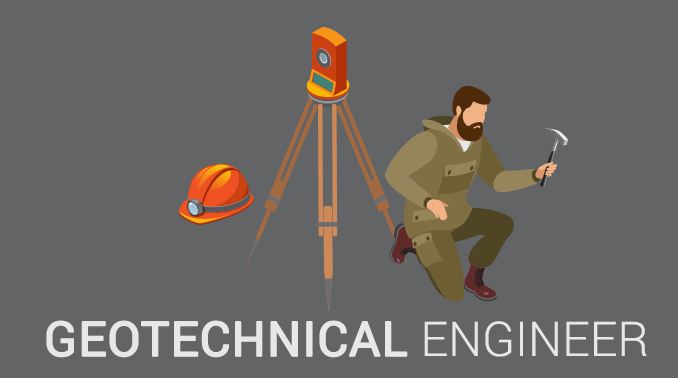Some Known Questions About Geotheta.
Wiki Article
Some Ideas on Geotheta You Should Know
Table of ContentsLittle Known Questions About Geotheta.Some Ideas on Geotheta You Need To KnowGeotheta Things To Know Before You Get ThisGeotheta Things To Know Before You Get ThisA Biased View of Geotheta

They conduct website examinations, accumulate samples, execute laboratory examinations, and assess information to assess the suitability of the ground for construction jobs - Tailings Engineer. Based on their findings, geotechnical engineers give suggestions for foundation layout, incline security, retaining frameworks, and mitigation of geotechnical hazards. They team up with various other experts, such as engineers, architectural engineers, and building and construction groups, to ensure that geotechnical factors to consider are integrated right into the total job layout and execution
By evaluating the behavior and buildings of dirt and rock, they can determine prospective geotechnical hazards such as landslides, soil negotiation, or incline instability. Their competence helps prevent failures or accidents that can threaten lives and building. Right here are some thorough responsibilities and responsibilities of a geotechnical engineer: Site Investigation: Geotechnical engineers conduct website examinations to collect information on subsurface problems.
They analyze the data to recognize the homes and actions of the dirt and rock, including their strength, leaks in the structure, compaction features, and groundwater problems. Geotechnical Analysis and Design: Geotechnical designers assess the data collected during site examinations to assess the security and suitability of the site for construction jobs. They carry out geotechnical computations and modeling to review variables such as bearing ability, settlement, slope security, lateral planet pressures, and groundwater circulation.
Some Known Incorrect Statements About Geotheta
Structure Design: Geotechnical designers play an important function in creating structures that can safely sustain the designated framework. They examine the dirt problems and lots needs to identify the appropriate structure type, such as superficial foundations (e.g., grounds), deep foundations (e.g (https://geotheta.carrd.co/)., heaps), or specialized methods like soil improvement. They take into consideration elements such as settlement limitations, bearing ability, and soil-structure interaction to create ideal structure layoutsThey examine building strategies, monitor site activities, and conduct field assessments to verify that the layout recommendations are followed. If unexpected geotechnical concerns arise, they evaluate the circumstance and give recommendations for removal or modifications to the layout. Threat Evaluation and Reduction: Geotechnical engineers analyze geotechnical risks and threats connected with the job website, such as landslides, liquefaction, or dirt erosion.

Cooperation and Interaction: Geotechnical engineers function very closely with other specialists entailed in a job, such as engineers, architectural designers, and construction teams. Reliable communication and partnership are necessary to incorporate navigate to these guys geotechnical considerations right into the total job style and building process. Geotechnical designers give technological expertise, answer queries, and ensure that geotechnical demands are fulfilled.
The Ultimate Guide To Geotheta
Below are some kinds of geotechnical designers: Foundation Designer: Foundation designers focus on developing and analyzing foundations for frameworks. They assess the dirt conditions, lots demands, and website qualities to figure out one of the most proper structure kind and layout, such as superficial foundations, deep foundations, or specialized techniques like heap foundations.They review the factors affecting slope stability, such as soil properties, groundwater conditions, and slope geometry, and establish strategies to stop incline failures and reduce risks. Quake Designer: Quake engineers specialize in evaluating and designing frameworks to endure seismic pressures. They evaluate the seismic risk of a website, review soil liquefaction potential, and establish seismic design criteria to make sure the security and durability of frameworks during quakes.
They carry out field screening, gather samples, and assess the collected data to characterize the soil homes, geologic formations, and groundwater problems at a site. Geotechnical Instrumentation Engineer: Geotechnical instrumentation designers concentrate on monitoring and measuring the habits of soil, rock, and structures. They mount and keep instrumentation systems that keep track of variables such as soil negotiation, groundwater degrees, slope motions, and architectural variations to examine performance and offer very early cautions of possible concerns.
Geotheta Can Be Fun For Anyone
They perform examinations such as triaxial tests, consolidation examinations, direct shear examinations, and permeability examinations to gather information for geotechnical analysis and style. Geosynthetics Engineer: Geosynthetics engineers specialize in the design and application of geosynthetic materials, such as geotextiles, geogrids, and geomembranes. They make use of these materials to improve dirt security, reinforce inclines, give drain solutions, and control disintegration.They tend to be investigative people, which means they're intellectual, introspective, and analytical. They wonder, systematic, sensible, logical, and logical. Several of them are also social, indicating they're kind, generous, cooperative, individual, caring, useful, compassionate, skillful, and friendly. Does this seem like you? Take our complimentary occupation test to learn if geotechnical designer is one of your leading career suits.
In the office setting, geotechnical engineers make use of specialized software program devices to do calculations, create designs, and evaluate information. They prepare reports, evaluation job specifications, connect with customers and employee, and coordinate project activities. The workplace setup gives a conducive atmosphere for research study, analysis, and collaboration with various other experts included in the task.
Our Geotheta Ideas
They frequently visit job sites to perform site examinations, analyze geotechnical problems, and gather information for evaluation. These gos to include traveling to various areas, in some cases in remote or tough surfaces. Geotechnical designers may perform dirt tasting, conduct tests, and monitor building activities to guarantee that the geotechnical elements of the task are being applied correctly.Geotechnical designers also work in specialized geotechnical research laboratories. Geotechnical lab engineers work extensively in these environments, managing testing devices, operating instruments, and videotaping information.
Report this wiki page